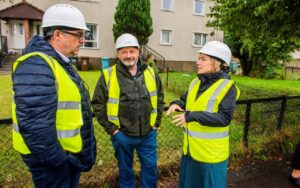
Member reflection
“Reflecting on the Commission’s work this year, I’ve been struck by the interconnected nature of the challenges and opportunities we face as we try to ensure a just transition to net zero. In particular, the way one sector’s challenge could be another sector’s opportunity. For example, during the Commission’s engagement with the construction and built environment sector, the importance of better insulating our existing buildings came up time and time again. The business-as-usual mindset suggests that we will likely procure existing mass-market insulation products, probably from overseas, which are often high in embodied carbon, to undertake this work. However, with the right policy drivers in place, the opportunity to grow Scotland’s domestic insulation market would have significant social, environmental, and economic benefits, particularly if natural, low embodied carbon solutions were incentivised. A presumption in favour of products ‘Made in Scotland’ would secure green jobs for decades to come both in manufacturing and installation activities. However, we don’t currently manufacture enough insulation in Scotland, but have some of Europe’s leakiest buildings, so the domestic market opportunity is huge, never mind the international market.
Cue the Commissions visit to Grantown-on-Spey to engage with farmers, landowners, and rural communities to understand better the challenges facing land use and agriculture in the future. If there are to be substantial changes to land uses to tackle the climate crisis, and some of the activities we currently undertake change, freeing up land for alternative uses, might it present an opportunity to explore how this sector could literally grow the raw materials needed to support Scotland’s building insulation programme? Trees grown to support a woodfibre insulation market, or faster growing crops like Hemp, if licensed in Scotland, could help scale up the kind of work companies like Indinature in Jedburgh are pioneering. The challenge of what to do with Scotland’s fields and forests quickly turns into an opportunity that delivers solutions that are not just “Made in Scotland, but also “Made from Scotland”. There are undoubtedly many barriers to realising the potential for the agriculture sector to transition into a key supply chain partner for the construction sector, but with the right joined-up-thinking across sectors, identifying complimentary needs and capabilities that, with the right interventions, create new, innovative opportunities, our transition to net zero has the potential to deliver the right blend of economic, social, and environmental impact for Scotland that’s just, fair, and equitable for all.
This blog was first published in our annual report 2023.